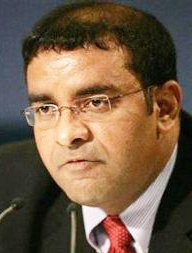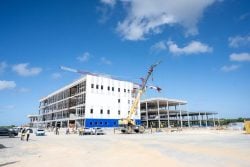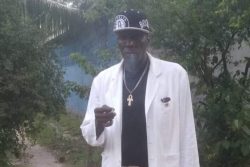– Jagdeo
Political agreement at ongoing negotiations to forge a new climate pact at Copenhagen, Denmark will not be enough and a binding agreement that will be codified within an international treaty within six months is needed, President Bharrat Jagdeo says.

He made the comment while announcing the completion of the second draft Low Carbon Development Strategy (LCDS) at the Office of the President yesterday. Jagdeo leaves for the crucial talks today and referring to the global financial crisis, said that the past year has shown what the international community can do when its interests are in danger, adding that the planet and the livelihood of its six billion people call for a similar resolve.
The President noted that there has been talk in recent weeks of a political agreement being enough. “We must not be satisfied with political rhetoric or platitudes. Copenhagen will be a failure unless we leave with a binding agreement including mandatory commitments from developed countries to be codified within an international treaty within six months”, he asserted.
He added that Copenhagen will be a failure unless it acknowledges that even temperature stabilization at two degrees above pre-industrial levels is too high. “We must put in place arrangements to regularly review the science behind climate change and find measures to increase our ambition if needs be”, he stated. Further, the president said, the talks will be a failure unless there is agreement on significant financial transfers from Annex 1 countries to the developing world.
“If leaders leave Copenhagen without these three commitments, then history will judge them poorly”, said the president. In recent months, he pointed out, the possibility of commitments of the scale that might be needed have been spoken about.
The president pointed out that the European Union and others have agreed a figure of US$150B per year by 2020 which he said is still probably too low but at least “in the right ballpark”.
On the LCDS, Jagdeo said that over the past four months Guyanese have taken part “in one of the most comprehensive national conversations on climate change to take place anywhere in the world”.
He said that over 10% of the population attended the information sessions and consultations. The President challenged anyone to show any other country “where as large a proportion of the population has engaged in an endeavour as comprehensive as this” while reminding that it is not over.
On Wednesday, the second draft of the LCDS was released and the members of the multi-stakeholder steering committee have started the next wave of reviews, Jagdeo said. “Over the next three months, I hope that people will take the time to review the updated version, which reflects the outcomes of the consultations that took place this year”, he stated, adding that he hoped that Members of Parliament will read, debate and improve the document in the National Assembly. The strategy is about the long term direction of the country and will long outlast the current government, he asserted.
Advancing
“I recognize that it can sometimes be confusing when our national process is advancing quickly alongside an international process which involves important milestones like the meeting at Copenhagen”, said Jagdeo adding that he will be going to Copenhagen with a message that the people of Guyana want to act. “I will be pointing to the progress we have made so far and the process that is underway”, he said adding that the national process is paramount and it will continue in the months after Copenhagen. “Indeed it will be significantly informed by what emerges at Copenhagen and it is vital that Copenhagen shows that the world is serious about facing down climate change”.
He stated that if leaders leave Copenhagen without the three commitments mentioned earlier, then history will judge them poorly. The president commented that this is partly because it is about justice. “It is simply wrong to condemn millions of people to misery and in some cases death because we could not muster the resolve to save them”, he said.
If climate change is to be defeated countries need to unleash the biggest wave of innovation the world has ever seen to stimulate energy efficiency, catalyze a global move to clean energy and to redesign the agricultural and forest economies, he said. “We recognize that most of this has to happen in the developed world but we also need to open up the struggle against climate change to the millions of innovators, entrepreneurs, activists and talk leaders who live and work throughout the developing world”. In this light, he stated that in a few years, over US$1 trillion will be in circulation for the new technologies and new ideas that are needed in the years ahead. He declared that if this money remains in the developed world, it will create a new protected industry “just like has happened so many times before”. The president argued that this is not only wrong but utterly shortsighted “because it means that we will stifle the ideas to defeat climate change in the very places where those ideas and solutions are most likely to originate”.
Meantime noting the US$250M forest preservation agreement signed with Norway, the president said that next year, Guyana can start to forge this new economy and is ready to implement tough reforms. Norway’s payments for forest services will enable Guyana to begin shifting towards a low carbon development trajectory and next year, US$30M in low carbon and adaptation work will be funded as a result, he noted. “In the 2010 budget we will outline the first wave of priority investments for our low carbon future and establish the Guyana REDD (reducing emissions from deforestation and forest degradation) investment fund to do this”, he said.
While this is a welcome start, Copenhagen needs to create these incentives more widely and then whether for social justice or self-interest, countries can align behind a set of goals to stabilize global temperatures, Jagdeo said.
The president said that the next LCDS starts to frame the decisions Guyana needs to make if the country is to participate in the REDD mechanism as part of the United Nations Framework Convention on Climate Change. “We are ready to implement tough reforms where that is needed”, he declared.




